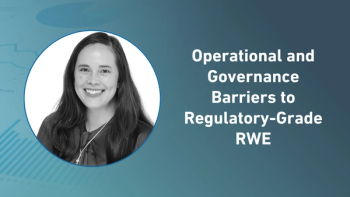
- Applied Clinical Trials-06-01-2022
- Volume 31
- Issue 6
Administering Complex Cognitive Tests Remotely in The Cognitively-Impaired
Pandemic aside, remote solutions are advancing care in clinical trials.
While the COVID-19 pandemic has undoubtedly catalyzed the adoption of more flexible data- collection approaches within clinical trials, this has been the direction of travel for some time. Rather than bringing participants into sites, allowing them to participate from the safety of their own homes by leveraging remote data-collection methods placed participant preference at the center of the research effort and positively impacted participant engagement. The use of electronic methods to capture clinical outcomes assessment (COA) data has facilitated this pivot, as has the use of telehealth applications. However, some cognitive assessments—such as the Mini-Mental State Examination (MMSE) and the Montreal Cognitive Assessment(MoCA)—require complex interactions between the participant and clinician to assess dementias and other neurocognitive disorders. These cognitive COAs are more difficult to administer remotely and require creative solutions to accommodate a cognitively-impaired population.
When choosing a cognitive assessment, it is important to consider whether the assessment is both appropriate to the population being investigated and that it will address the hypothesis and fulfill the criteria for the trial estimand. Another consideration is whether the assessment license holder will allow it to be performed remotely. There are several less complex cognitive COAs that more easily translate to a remote environment and indeed some are specifically designed for this purpose. However, these “less-complex” assessments may not satisfy the needs of the trial or be suitable for the population.
Telephone-based visits can accommodate some cognitive COAs, but many validated and standardized examples commonly used in clinical trials include a combination of clinician interview and participant performance tasks (e.g., drawing shapes, completing diagrams, or behavioral tasks). Under traditional administration conditions, the clinician and participant sit facing each other. The clinician can observe the participant’s behaviors and task completion. Drawing, writing, or diagramming tasks are typically done on paper, which becomes a source document and must be stored in the participant’s study file; this is not practical under remote administration conditions. Source documents must be dated and signed off to ensure they are compliant with ALCOA+ principles. In fact, to be truly ALCOA+ compliant, paper source records should always be “available” to the study investigator even before later delivery to the site. Photo images of paper records cannot be considered source. Despite these obstacles, there are creative solutions available for administering cognitive COAs remotely.
An approach that eCOA Consortium members have seen work in persons with dementia is by combining a secure telehealth system with an eCOA application. Clinicians and participants (assisted by study partners) are provisioned with tablet devices (with styli) that allows them to interactively write or draw directly on to the tablet screen when required. The clinician initiates the interview and records responses on their tablet. When it is time for the participant to perform the drawing task the clinician can “hand-off” access to the participant. The participant logs in with their own unique ID and uses the stylus to complete the task on their tablet device. The image created by the participant becomes the source data record and is saved directly to the server along with the associated meta-data that ensures compliance.
The telehealth system also allows the clinician to view and rate other participant behaviors, such as following commands and object naming that are common to these types of COAs. When migrating cognitive COAs to digital format, best practices guidelines should be followed. For example, when using the Repeatable Battery for Assessment of Neuropsychological Status (RBANS), digital drawing would be classified as a Level II change that would require psychometric testing.
Regardless of the pandemic, solutions like these are proving beneficial for all research stakeholders. Participants, study partners, and clinicians are all able to perform critical activities remotely. This approach focuses on the participant and is driven by science and technology, enhancing participant recruitment and retention, and reducing participant burden.
Authored on behalf of Critical Path Institute’s eCOA Consortium by Rinah Yamamoto, Principal Scientist, Clinical Ink; and Shelly Steele, Senior Scientific Advisor, eCOA, WCG – MedAvante-ProPhase. The eCOA Consortium wishes to acknowledge the contributions of Jonathan Andrus to this article.
Articles in this issue
over 3 years ago
Regulatory Considerations for Digitally Driven Trialsover 3 years ago
Quantifying Protocol Deviation Experience by Clinical Phaseover 3 years ago
School’s Out for Summer, But Learning Continuesover 3 years ago
Applied Clinical Trials June 2022 Issue (PDF)over 3 years ago
New Guidelines Aim to Advance Pediatric Drug Developmentover 3 years ago
Report Admonishes EMA Efforts to Reform Trial TransparencyNewsletter
Stay current in clinical research with Applied Clinical Trials, providing expert insights, regulatory updates, and practical strategies for successful clinical trial design and execution.




